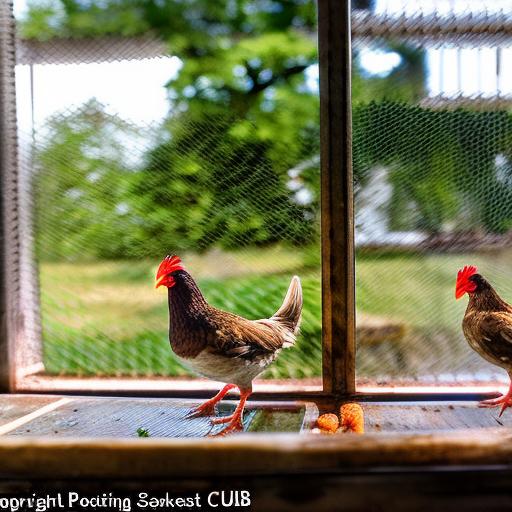Keeping chickens on a screened-in porch is a unique and innovative way to enjoy the benefits of raising chickens while also keeping them safe and protected. This setup involves creating a designated space on a screened-in porch where chickens can live and thrive. By providing them with a secure and enclosed area, you can enjoy the presence of chickens without the worry of predators or pests. This article will explore the benefits of keeping chickens on a screened-in porch, considerations before starting this endeavor, designing a suitable chicken coop, choosing the right breeds, feeding and watering chickens, maintaining cleanliness, ensuring proper ventilation, dealing with predators and pests, and legal considerations.
Key Takeaways
- Keeping chickens on a screened-in porch is a great way to have fresh eggs and enjoy the benefits of backyard chickens without a large yard.
- Benefits of keeping chickens on a screened-in porch include easy access to eggs, natural pest control, and the enjoyment of watching chickens.
- Considerations before keeping chickens on a screened-in porch include local zoning laws, space limitations, and noise concerns.
- Designing a suitable chicken coop on a screened-in porch involves providing enough space, nesting boxes, and roosting areas for the chickens.
- Choosing the right breeds for a screened-in porch involves selecting breeds that are adaptable to small spaces and have a calm temperament.
Benefits of Keeping Chickens on a Screened-in Porch
One of the main benefits of keeping chickens on a screened-in porch is the convenience it offers. Having chickens close to the house allows for easy access to fresh eggs and the ability to monitor their health and well-being. Additionally, it eliminates the need to trek out to a separate coop in inclement weather or during nighttime hours.
Another advantage of this setup is the reduced risk of predators and pests. The screened-in porch provides a barrier that keeps out potential threats such as raccoons, foxes, or snakes. It also prevents insects and other pests from entering the coop area, reducing the risk of infestations or diseases.
Furthermore, maintaining cleanliness becomes much easier when keeping chickens on a screened-in porch. The enclosed space makes it simpler to clean out the coop and dispose of waste properly. It also minimizes the spread of odors and keeps the surrounding area cleaner.
Considerations Before Keeping Chickens on a Screened-in Porch
Before embarking on this endeavor, it is essential to check local laws and regulations regarding keeping chickens in residential areas. Some cities or neighborhoods may have restrictions or specific guidelines that need to be followed. It is crucial to ensure compliance with these regulations to avoid any legal issues.
Adequate space and ventilation are also important considerations. Chickens need enough room to move around comfortably and engage in natural behaviors. Additionally, proper ventilation is necessary to maintain good air quality and prevent the buildup of moisture and ammonia.
Noise and odor concerns should also be taken into account. While chickens are generally not excessively noisy, some breeds may be more vocal than others. It is important to consider the proximity of neighbors and whether the noise may cause disturbances. Similarly, while proper maintenance and cleanliness can minimize odors, it is essential to be mindful of any potential odor issues that may arise.
Designing a Suitable Chicken Coop on a Screened-in Porch
When designing a chicken coop on a screened-in porch, there are several factors to consider. The coop should provide adequate space for the number of chickens being kept. Each chicken should have at least 4 square feet of space inside the coop and 10 square feet in the outdoor run area.
Nesting boxes are also essential for chickens to lay their eggs. These should be easily accessible and provide a comfortable and private space for the hens. A general rule of thumb is to have one nesting box for every four to five hens.
Easy access to food and water is another important aspect of coop design. Feeders and waterers should be placed at a height that is convenient for both chickens and humans. They should also be easily accessible for cleaning and refilling.
Choosing the Right Breeds for a Screened-in Porch
When selecting breeds for a screened-in porch setup, it is important to choose breeds that are well-suited for smaller spaces. Bantam breeds, such as Silkies or Seramas, are popular choices as they are smaller in size and require less space compared to standard-sized breeds.
Quiet and docile breeds are also ideal for a residential setting. Some breeds, such as Australorps or Orpingtons, are known for their calm and friendly temperament, making them suitable for close proximity to neighbors.
Additionally, it is important to choose breeds that are good egg layers. Breeds such as Leghorns or Rhode Island Reds are known for their high egg production, ensuring a steady supply of fresh eggs.
Feeding and Watering Chickens on a Screened-in Porch

Feeding and watering chickens on a screened-in porch can be easily accomplished with the right equipment. Feeders should be designed to prevent spillage and waste. Hanging feeders or treadle feeders are popular options that keep the feed clean and easily accessible to the chickens.
Water containers should be designed to prevent spillage and contamination. Chicken nipples or waterers with a small cup design work well in this setup. It is important to provide fresh water daily and ensure that the chickens have access to clean and balanced feed.
Establishing a regular feeding and watering schedule is also important. Chickens thrive on routine, so it is beneficial to feed them at the same time each day. This helps maintain their health and ensures they receive the necessary nutrients.
Maintaining Cleanliness in a Chicken Coop on a Screened-in Porch
Regular cleaning and maintenance are crucial for the health and well-being of chickens in a screened-in porch setup. The coop should be cleaned out at least once a week, removing any soiled bedding or waste. This helps prevent the buildup of ammonia and reduces the risk of diseases.
Cleaning supplies such as a rake, shovel, and broom are essential for maintaining cleanliness. It is important to use appropriate disinfectants to sanitize the coop and prevent the spread of bacteria or parasites.
Proper waste disposal is also important. Chicken manure can be composted and used as fertilizer for gardens or flower beds. However, it is important to ensure that the composting process is done correctly to prevent the spread of pathogens.
Ensuring Proper Ventilation for Chickens on a Screened-in Porch
Proper ventilation is crucial for the health and well-being of chickens in a screened-in porch setup. Good air quality helps prevent respiratory issues and reduces the risk of heat stress.
There are several ways to provide ventilation in a screened-in porch setup. Installing windows or vents that can be opened and closed allows for airflow control. It is important to monitor temperature and humidity levels regularly to ensure they are within the appropriate range for chickens.
Dealing with Predators and Pests on a Screened-in Porch
While a screened-in porch provides protection against many predators and pests, it is still important to be vigilant and take preventive measures. Common predators such as raccoons or snakes can still pose a threat, so it is important to regularly inspect the coop for any potential entry points and reinforce them if necessary.
Using hardware cloth or wire mesh with small openings can help prevent pests such as rodents or insects from entering the coop area. Regular monitoring and maintenance are essential to identify and address any potential issues promptly.
Legal Considerations of Keeping Chickens on a Screened-in Porch
Before starting a chicken coop on a screened-in porch, it is important to research and understand the laws and regulations that apply to your area. Some cities or neighborhoods may have restrictions on the number of chickens allowed or specific guidelines regarding coop design or placement.
In some areas, permits or licenses may be required to keep chickens. It is important to obtain any necessary permits and follow all applicable laws and regulations to avoid any legal issues.
Keeping chickens on a screened-in porch offers numerous benefits, including convenience, reduced risk of predators and pests, and ease of maintenance. However, it is important to consider local laws and regulations, provide adequate space and ventilation, and address potential noise and odor concerns. Designing a suitable chicken coop, choosing the right breeds, and ensuring proper feeding, watering, cleanliness, ventilation, and predator prevention are all important aspects of successfully keeping chickens on a screened-in porch. By following these guidelines and considering the legal considerations, individuals can enjoy the rewarding experience of raising chickens in a residential setting.
If you’re considering keeping chickens on a screened-in porch, you may also be interested in learning about the different types of chicken coops available. Poultry Wizard has a helpful article on their website that showcases two unique chicken coop designs: the Hannah Montana Chicken Coop and the Farmhouse Chicken Coop. These coops not only provide a safe and comfortable space for your chickens but also add a touch of style to your backyard. To read more about these innovative coop designs, check out the article here.
FAQs
What are the benefits of keeping chickens on a screened in porch?
Keeping chickens on a screened in porch can provide fresh eggs, entertainment, and a natural pest control solution. It also allows for easy access to the chickens for feeding and cleaning.
What are the requirements for keeping chickens on a screened in porch?
To keep chickens on a screened in porch, you will need to provide them with adequate space, food, water, and shelter. You will also need to ensure that the porch is secure and predator-proof.
What types of chickens are best for keeping on a screened in porch?
Bantam breeds, such as Silkies and Cochins, are often recommended for keeping on a screened in porch due to their smaller size and quieter nature. However, any breed of chicken can be kept on a porch as long as they have enough space and proper care.
What are the potential drawbacks of keeping chickens on a screened in porch?
Keeping chickens on a screened in porch can create noise and odor, which may be a nuisance to neighbors. It can also be difficult to maintain a clean living space for the chickens, which can lead to health issues.
What should I consider before keeping chickens on a screened in porch?
Before keeping chickens on a screened in porch, you should check with your local zoning laws and homeowner’s association regulations to ensure that it is allowed. You should also consider the amount of time and effort required to care for the chickens and whether you have the necessary resources to provide for them.
Meet Walter, the feathered-friend fanatic of Florida! Nestled in the sunshine state, Walter struts through life with his feathered companions, clucking his way to happiness. With a coop that’s fancier than a five-star hotel, he’s the Don Juan of the chicken world. When he’s not teaching his hens to do the cha-cha, you’ll find him in a heated debate with his prized rooster, Sir Clucks-a-Lot. Walter’s poultry passion is no yolk; he’s the sunny-side-up guy you never knew you needed in your flock of friends!







